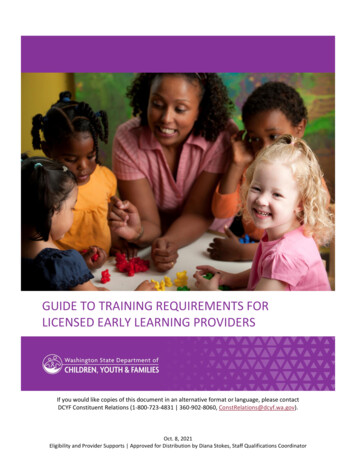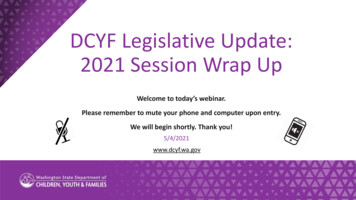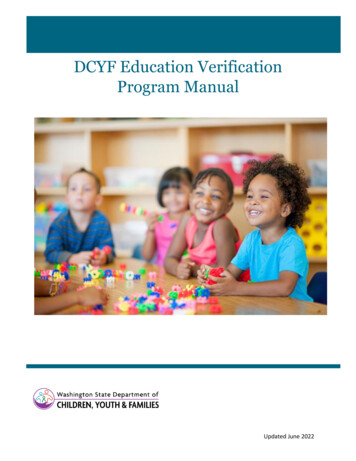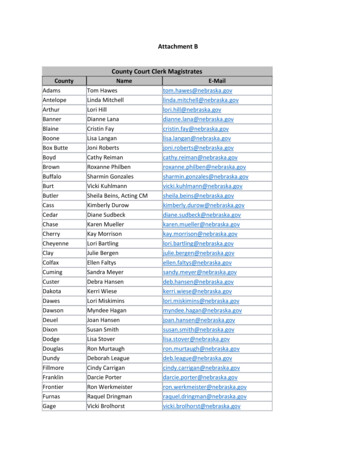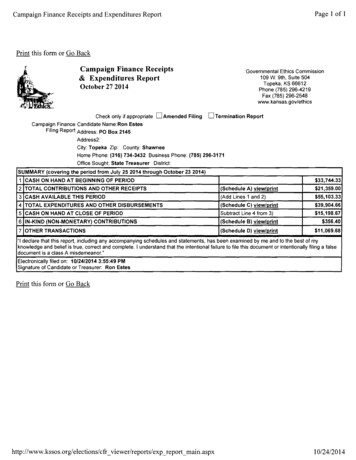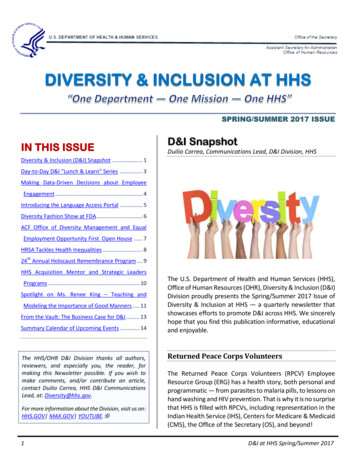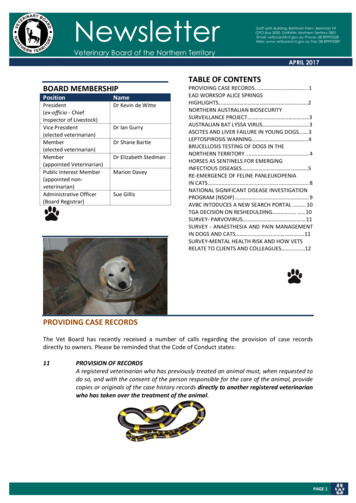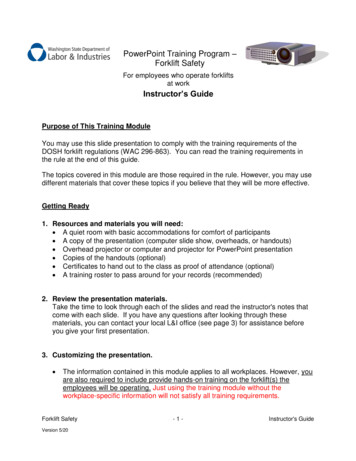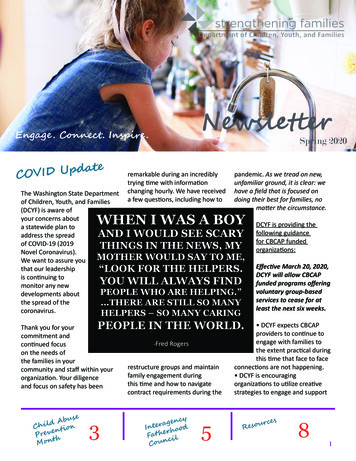
Transcription
Engage . Connect. Inspire .dateCOVID UpNewsletterSpring 2020remarkable during an incrediblytrying time with informationchanging hourly. We have receiveda few questions, including how topandemic. As we tread on new,unfamiliar ground, it is clear: wehave a field that is focused ondoing their best for families, nomatter the circumstance.The Washington State Departmentof Children, Youth, and Families(DCYF) is aware ofyour concerns abouta statewide plan toAND I WOULD SEE SCARYaddress the spreadof COVID-19 (2019THINGS IN THE NEWS, MYNovel Coronavirus).MOTHER WOULD SAY TO ME,We want to assure youthat our leadership“LOOK FOR THE HELPERS.is continuing toYOU WILL ALWAYS FINDmonitor any newPEOPLE WHO ARE HELPING.”developments aboutthe spread of the.THERE ARE STILL SO MANYcoronavirus.HELPERS – SO MANY CARINGWHEN I WAS A BOYDCYF is providing thefollowing guidancefor CBCAP fundedorganizations:Effective March 20, 2020,DCYF will allow CBCAPfunded programs offeringvoluntary group-basedservices to cease for atleast the next six weeks.PEOPLE IN THE WORLD. DCYF expects CBCAPThank you for yourproviders to continue tocommitment andengage with families to-Fred Rogerscontinued focusthe extent practical duringon the needs ofthis time that face to facethe families in yourrestructure groups and maintainconnections are not happening.community and staff within yourfamily engagement during DCYF is encouragingorganization. Your diligencethistimeandhowtonavigateorganizations to utilize creativeand focus on safety has beencontract requirements during thestrategies to engage and supportused 5surceReso81
COVID Cont.families during this uncertain time, such asphone calls or virtual groups, using securetechnology platforms. All programs should maintaindocumentation of each contact with familiesand the services/information provided. DCYF asks that organizations document thefinancial and staffing impacts of COVID-19on the program and organization to help uscommunicate your challenges and work to providesolutions and supports. During this time, CBCAP funded programs may alsoconsider other activities that support the ongoing,high-quality work of your program, such as distancebased professional development, especially as itrelates to engaging families virtually. DCYF understands that not all organizations orfamilies are currently set up to conduct virtual visits,staff may be reassigned and there are backlogs onsome technology due to the increased demands ofteleworking. We know there may be many morequestions as it relates to virtual connections. If youhave specific questions about virtual visits, contactyour DCYF program specialist.During this time, DCYF intends to pay all invoiceswith valid program costs regardless of whetherperformance milestones such as participation,program completion, etc., have been met. Invoices should be submitted within 15 businessdays of the current due date. DCYF is revising the due date for the Quarter 3report, which will now be due May 15, 2020. DCYF site visits to programs will be converted tovirtual visits. For Group-Based Parent Education Programs:COVID - 19CBCAP Spring Training will not be in person, furtherdetails to follow. For Perinatal Mental Health Communities: Inperson, Perinatal Mental Health GPS FacilitatorTraining, Perinatal Support Washington (PS-WA) willoffer a booster training for now virtually. However,GPS facilitators will have to complete the full trainingon the next available opportunity. This opportunitywill only be available to DCYF-funded support groupswho currently do not have a trained GPS facilitatorfor their groups. The next Two-Day Perinatal Mood and AnxietyDisorder (PMAD) training is being scheduled for June,and we are remaining optimistic that this training willbe offered as scheduled. DCYF recommends documentation of financial andstaffing impacts of COVID-19 on your organization.We will continue to update you on new informationas best we can. More information about in-personmeetings and trainings will be forthcoming. Forexisting programs with contracts, we have weeklyoffice hours via WebEx on Wednesdays from 8:309:30 am. As new questions arise please send themto strengtheningfamilies@dcyf.wa.gov.Thank you for your commitment and dedication toWashington families.Sesame Street ResourcesMy Healthy Week!Chart a schedule of the ways little ones can staystrong with this free printable.How to Wash Your HandsShare the video featuring Bebe to show the right wayto stop the spread of germs, and have a child showyou how they use soap, then water!H is for HandwashingRead this storybook to explore the ways that childrenacross the world stay happy and healthy. Invitechildren to think about how the ways we wash ourhands that may be different and similar to our friendsin other places.Not Sesame Street, but this video shows how effectivewashing hands with soap can be.2
COVID-19 Update Message from DOHThe state Department of Health wants to keepyou as informed as possible about continuingdevelopments surrounding COVID-19.Social Distancing and Mental HealthWe need each other. Being isolated from otherpeople can make our physical and mental healthworse and can trigger anxiety and depression. Socialdistancing is hard on our bodies and our emotions.If you find yourself lonely, stressed or anxious, payattention to these emotions and take action:1. Avoid watching, reading or listening to newsreports that cause you to feel anxious ordistressed. Seek out information from reliablesources like DOH or the Centers for DiseaseControl and Prevention just a couple times a day.2. Stay connected with others and maintain yoursocial networks. Go for a walk and wave to yourneighbors from six feet away.3. Introduce structure into your day. Even if youare working from home, try to maintain familiarroutines in daily life as much as possible.4. Check out these resources to help support yourmental health or that of a loved one: Care for Your Coronavirus Anxiety ToolkitHow to Help Someone with Anxiety or Depressionduring COVID-19Resources to Support Mental Health and Copingwith the CoronavirusAnd if you are in crisis, don’t hesitate to call the24-Hour Crisis Line at 866-427-4747 or text HEAL to741741 to get confidential text access to a trainedcrisis counselor any time of the day or night.Remember, you can find great information: DOH web portal for information about COVID-19wa.gov Department of Health website doh.wa.govo call our COVID-19 hotline at 1-800-525-0127and press #o email us at Information@doh.wa.gov CDC website cdc.govPractice compassion. Stay at home to protect thepeople you love.Child Abuse Prevention MonthApril is Child Abuse Prevention month. This year will look a bitdifferent than years past, but it’s never been more important tosupport families to ensure all children grow up safe, happy andhealthy.As we all practice our Stay Home, Stay Healthy order, we won’t beable to plant our pinwheels at the Capitol Campus. We will, however,find ways to celebrate together virtually. You can create your ownpinwheel garden at home, using this set of instructions from PreventChild Abuse America.You can send in photos from home on Friday, April 3, as we all#WearBlue. We will host a coloring campaign through social mediawith some fun prizes. Check in throughout the month to DCYF’s Facebook page as we share tips andsupports for families, so that we can continue to create great childhoods for all children.3
Unsung HeroesIt seems like a lifetime ago now, but in February we celebrated Parent Recognition month with our annualUnsung Hero Awards Dinner. We celebrated parents, caregivers and community members who go aboveand beyond to create heathy, happy childhoods for children. You can check out our photos from the eventhere.4
Washington StateInteragency FatherhoodCouncil Needs your voice!Fathers across the State of Washington report thatit is difficult to locate programs that are open andwelcoming and focused on their unique needs.The Washington Interagency Fatherhood councilis conducting a survey to identify programs andservices that are specifically for fathers. If you area father-friendly service, please fill out this survey(https://www.research.net/r/BKN7ZWR). If youknow of other father-friendly services or programs, please forward the survey to them.The Survey will begin on March 23rd, 2020 and conclude on June 1st, 2020. If we need additional time due tothe COVID 19 crisis we will extend this into the summer further.Get your programs counted! Help us find the good work happening in the state.For more information please email anne.stone@dshs.wa.govCOVID - 19 ResourcesHere are some concrete supports that might bepertinent to you, your staff and your families.Anyone who has lost their job due to coronavirus orhas had to take time off to self-quarantine or care fora sick relative (and does not get paid sick time fromwork) should apply for unemployment insurance. Infoon that here.Anyone whose job has brought them into directcontact with someone with coronavirus (for instance,a first responder or a health care worker) and hasbecome ill or are required to quarantine can file forworker’s compensation. File for that here.If you or a friend or family member are out of work,Washington State’s Employment Security Departmentprovides support services as well.The Washington State Department of FinancialInstitutions has developed a list of financialresources for Washington consumers impacted bythe Coronavirus. They will add to this list as moreresources become available.COVID-19 resource list for impacted Washingtonbusinesses and workers information from theGovernor’s office.WSCADV has put together a variety of resources, bothrelated to IPV and general. You can find that here.Currently available FREE resources (mostly) inresponse to COVID-19:Free unlimited smartphone data from all fourmajor service providers (Verizon, Sprint, T-Mobile,AT&T) thanks to the FCC’S recent “Keep AmericansConnected Pledge” which also includes:- Not terminating service due to an inability to pay- Waiving late fees- WiFi hotspotsFor more information, go here.60 days of free Comcast Internet for low-incomehouseholds, the elderly, and veterans - continuedservice not required, can be cancelled at anytime.For more information, go here or here.5
Insights from DCYF’s Office of OrganizationalChange Management Reflect: Be aware of and take inventory of how your own life and personal circumstances are changing andanticipate what may yet change in the coming days, weeks and months. One of the hardest parts of changeand transition is letting go of “normal.” We depend on routines and schedules to manage our lives andfamilies. When these routines are disrupted, we lose our sense of certainty. Take some moments to thinkabout and write down what is or might be changing for you and your immediate family and friends. Payparticular attention to what might be changing for you individually. Organize: Varying degrees of uncertainty exist in any emergent situation. Our brains try to make sense ofa given situation and organize uncertainty into threats and non-threats. We can help guide this processby reflecting on the list of potential impacts we created and sort into “likely” and “unlikely” that they willhappen. Then, sort these by what is the largest impact to the smallest impact. Something that is unlikely,with a small impact, needs less attention than things that are very likely and have a big impact. Try usingthis with the list you created in your reflection. Adapt: Learning to shift our energy and actions in times of uncertainty helps us become adaptable.Think about a time when you were able to adapt and persevere through a difficult time. What madethat possible? Who and what helped you most during that time? How can you apply that to thecurrent situation? We are incredibly capable individuals and often our strength and resourcefulness areunderestimated. Dive in and appreciate the tools, experience and resilience you already have that may beuseful now. Naming our emotions: Deliberately thinking about our emotions during times of change helps in ourdecision-making. Some questions to reflect on include: “What am I feeling right now? Why am I feelingthis? How might I think differently about this or take a different perspective? What actions can I take rightnow that might make this situation better?” Inquire: Explore resources and articles that help provide reliable information. Check the WashingtonState Department of Health website, the Centers for Disease Control and Prevention website or otherpublic health resources. Knowledge will help us all understand the COVID-19 response better and bebetter prepared for what is ahead of us. While commentary and editorials may be interesting, stick tothe facts and what is made available by trusted experts. And, it’s never too late to learn about personalpreparedness for yourself and your family. Practice: Have you ever tried something new that felt awkward at first? Well, this might be one of thosetimes. Done is better than perfect and the phrase “try it” applies here. Try some of these tools to helpyou manage the changes occurring. If we fail or have a different result than we expected, it’s okay. Trysomething else. We are all in this together and we might make mistakes or feel stressed or have lesspatience for certain situations (like grocery store lines!). Overall, we are humans trying to do our best.Practice patience and grace with yourself and others. Remember, we are all learning and dealing the bestwe can. Appreciate: Appreciate the strengths of others and your ability to navigate uncertainty. We have all metchallenges in our lives and have learned valuable lessons we can use right now. We can also pass ourlessons along to others. Share your appreciation and ideas with others and ask for help when you need it.We are wired for connection so seek ways to stay connected either virtually, via the phone, or if allowed, inperson with proper precautions. Give each other kudos for the small and big things that are helpful.6
Upcoming WebinarsThree Guiding Truths for Building Regulation andResilience in Children with Significant Trauma RelatedNeedsPresented by: Tiffany Sudela-JunkerMother by adoption, Tiffany Sudela-Junker sharesstories from her own personal and parentingtransformation along with the science & insight thatled her to uncover Three Guiding Truth’s for supportingchildren, parents and providers. She illustrates howresponding in biologically respectful ways buildsenvironments that support regulation, hope andresilience in children with significant trauma relatedneeds.Empowering Parents with the Brain Science andVROOM: “Vroom Can Help You Support the FamiliesYou Work With”Presented by: Marilyn GisserResearch tells us that early childhood is a critical periodof brain development. Babies are born learning. Theyare wired to seek attachment to responsive, caringadults. Caregivers’ everyday interactions with theirchildren play a critical role in supporting healthy braindevelopment, creating a foundation for lifelong healthand well-being. Positive caregiver-child interactions alsoboost protective factors that are proven to reduce thelikelihood of neglect and abuse.Time and Date: April 14, 2020; noon – 1 p.m.Register for Three Guiding Truths Webinar HereTime and Date: April 28, 2020; noon – 1 p.m.Register for Empowering Parents with the Brain Scienceand VROOM Webinar Here7
COVID -19 Resources to inform and support CBCAP ProgramsTo inform and support organizations:CWLA: Tips for preparing information and h and Human Services Partnership: The Centerfor Faith and Opportunity Initiatives (PartnershipCenter) recommended practices for faith andcommunity based program leaders.COVID-19 Recommended Preventive Practices andFAQs for Faith-based and Community LeadersChild Trends: Utilizing telehealth during the COVID-19pandemic to help connect home visiting services omevisiting-services-to-families?e 1006?referer from search resultZero to Three: resources offer tips for familiesincluding age-appropriate responses to commonquestions, a guide to self-care, and activities for youngchildren experiencing social 210-tips-forfamilies-coronavirusBe Strong Families: Resources to stay strong andpositive based on each of the protective supportCDC Guidelines and resources: (in English ov/ARCH: Identifying resources for respite and familycaregiver /uploads/2020/03/03.16.20 coronavirusguidance 8.5x11 315PM.pdfFor local programs to inform and support families:Prevent Child Abuse America: Tips for navirus-resources/Webinars:Living the Protective Factors during COVID-19, FastTrack Workshops, and Parent Cafés online using Zoom.This site contains both upcoming as well as recentlyarchived events.https://www.bestrongfamilies.org/eventsThe Child Mind Institute: Suggestions on talking withchildren about ids-aboutthe-coronavirus/SAMHSA: Guidance on talking with children aboutinfectious disease (English and Spanish)Blogs:Advancing the language of HOPE during COVID-19Dr. Bob Sege’s blog series about Love in the Time ofCoronavirus based on the Health Outcomes of PositiveExperiences (HOPE) initiative.Protective Factors Coloring BookThe Strengthening Families Washington team is proud to announce thecreation of our coloring book, Discovering Strengths Across Washington.The book teaches the Protective Factors through coloring, activiities andtips for parents. While we can’t send out physical copies of the book atthe moment, you can download a digital copy of the coloring book inboth English and Spanish. In addition, you can join Sasquatch, the star ofour coloring book, in our April Coloring Campaign as he celebrates thepinwheel - our Child Abuse Prevention Month symbol. See the next pagefor your coloring page, or download one online here.8
Download our Strengthening Families Washington Coloring book rts/sfwa .For more information contact strengtheningfamilies@dcyf.wa.gov .If you would like copies of this document in an alternative format or language, please contactDCYF Constituent Relations (1-800-723-4831 360-902-8060, ConstRelations@dcyf.wa.gov).DCYF PUBLICATION FS 0035 (02-2020)
DOH web portal for information about COVID-19 wa.gov Department of Health website doh.wa.gov o call our COVID-19 hotline at 1-800-525-0127 and press # o email us at Information@doh.wa.gov CDC website cdc.gov Practice compassion. Stay at home to protect the people you love. April is Child Abuse Prevention month.
